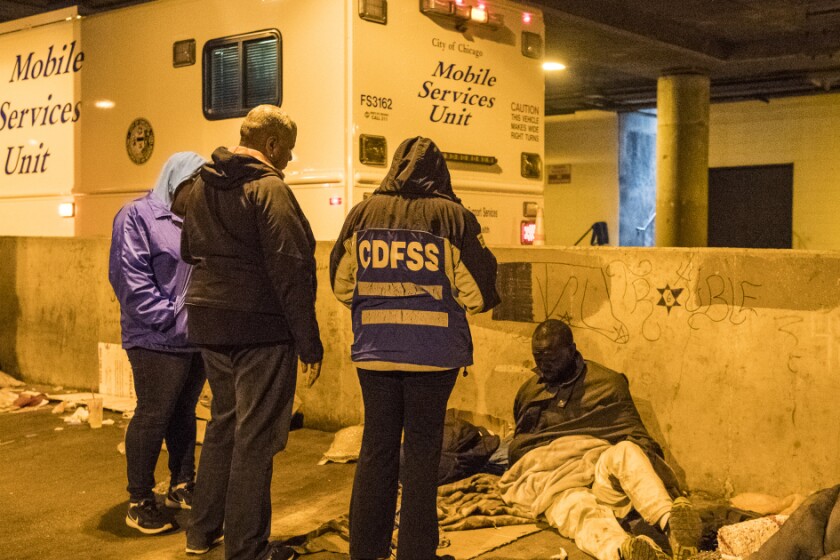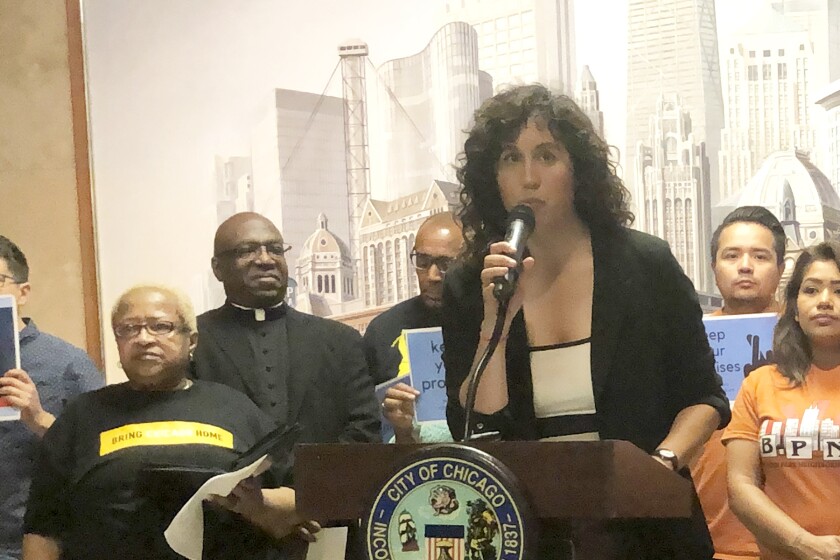
Mayor Johnson’s Bring Chicago Home referendum on the March primary ballot is invalid, Cook County judge rules
Voters would be asked to authorize the City Council to alter the real estate transfer tax and use the proceeds to generate $100 million a year to combat homelessness.
By Tessa Weinberg | WBEZ and Fran Spielman
Feb 23, 2024, 3:28pm

A member of Chicago Department of Family & Support Services speaks to a homeless man who resides in “The Triangle” about services that are available to him.
A Cook County judge Friday ruled that a referendum question funding homelessness prevention in Chicago via a real estate transfer tax increase on the March primary ballot is invalid, dealing a major political blow to the measure’s biggest proponent, Mayor Brandon Johnson.
Cook County Circuit Judge Kathleen Burke's ruling represents a big win for the real estate industry and development groups that sued to block the ballot measure, labeled by backers as the Bring Chicago Home referendum.
A spokesperson for the Chicago Board of Elections said until a more detailed order comes from the judge, the question will remain on the ballot, but votes on it will not be tallied. The board does not plan on pausing early voting as of now, and did not immediately say whether they plan to appeal the ruling. Voters had been already weighing in through mail ballots and in-person early voting.
The Building Owners and Managers Association of Chicago, the Chicagoland Apartment Association, the Neighborhood Building Owners Alliance of Chicago and others were among the industry groups that argued the ballot question was unconstitutional and violated state law by asking voters to approve both a tax cut and tax hike at the same time.
The suit asserted the referendum measure is a “textbook example” of a time-honored legislative tactic known as “log-rolling” — combining a politically unpopular proposal with a popular one to sugar-coat a bitter pill and, therefore, convince voters to swallow it.
Farzin Parang, executive director of the Building Owners and Managers Association, said the judge's ruling came as no surprise.
“The way that they worded this question was just sort of politics and it was vague and it was trying to manipulate people into thinking that they were getting a tax cut when this is, functionally, a property tax increase on everybody," Parang said. "We’re just gratified that the judge agreed with us.”
Parang acknowledged that, had the binding referendum remained on the ballot, Johnson and his allies would likely have won.
That’s because the March 19 turnout was expected to be low, and the person the mayor assigned to quarterback the campaign — Emma Tai, former executive director of United Working Families, a group affiliated with the Chicago Teachers Union — marshaled field operations for Johnson’s winning mayoral campaign.

Emma Tai (left) and Michelle Garcia, from Access Living, stand with other community activists as they issue their report card for Mayor Lori Lightfoot’s first 100 days in office. | Rachel Hinton/Sun-Times August 2019
That made the lawsuit the real estate industry’s best and possibly only shot at defeating the “Bring Chicago Home” effort.
“We are against a dramatic, dramatic increase in property-based taxes because, on the commercial side, we already have the highest commercial property tax in the country and it’s impeding our industry’s ability to recruit investment … at a very, very difficult time for the industry,” Parang said.
The ballot question asks voters to decide whether to authorize the Chicago City Council to quadruple the real estate transfer tax on the value of property transactions $1.5 million and over and triple the tax on the value of sales from $1 million up to $1.5 million. The tax on homes costing under $1 million, though, would go down.
Changing the real estate transfer tax from a flat tax to that three-tiered structure is estimated to bring in an additional $100 million in revenue annually. The money would be used to address homelessness, with advocates pointing to rental subsidies and mental health care as some of the potential uses.
The specific uses of the money would be determined by an advisory board and spending ordinance that would still need to be passed by the City Council if voters approve the measure. Revenue wouldn't have been expected to be budgeted for use by the city until 2026.
Johnson and supporters of the referendum argued the city needs a dedicated revenue stream to combat the rising number of people experiencing homelessness in the city. The referendum's backers estimate approximately 93% of property sales will see a tax cut under the plan.
Former Mayor Lori Lightfoot campaigned on a promise to raise the real estate transfer tax on high-end property sales to create a dedicated funding source to combat homelessness but broke that promise, infuriating what was her progressive base.
Johnson has been determined to avoid that mistake at a time when homelessness has been made worse by the ongoing migrant crisis.

No comments:
Post a Comment